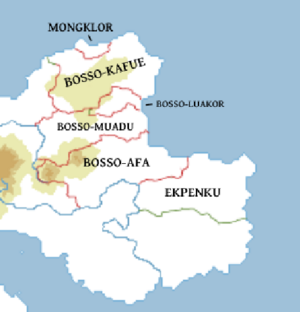Khobeh
Khobeh (Nyamu: Khɔbɛ̀), officially the Kingdom of Khobeh, is a country in eastern Nkungu, bordered by Afa to the south.
Kingdom of Khobeh Àgbà Khɔbɛ (Nyamu) | |
|---|---|
|
Flag | |
Motto: X | |
| Capital | Kashinkhor |
| Official languages | Nyamu |
| Recognised regional languages | Hlong Gara Nganka |
| Demonym(s) | Khobehi |
| Government | Elective constitutional monarchy |
• King (Mbolu) | Ndàkàri Jubùlà Kàṣi |
• Head of the Royal Assembly of Kashinkhor | Dada Kɔbuani |
| Legislature | Royal Assembly of Kashinkhor (Ndizu Kàṣiŋkhɔla) |
Etymology
The name Khobeh comes from the historical city Ŋkrɔ́bɛ̀ (modern-day Kashinkhor), meaning "central city" in Middle Bosso (from the words "ŋkrɔ́" (city; village) and "bɛ̀" (middle)), which became Khɔ́bɛ̀ in modern Nyamu.
History
Bosso Empire
(WIP)
Khobeh Confederation

Shortly after the collapse of the Bosso Empire in 2327 CY, four kingdoms arose from its former provinces, each of which were named after the dynasties of their ruling chiefs; the former province Alanku became Bosso-Kafue, the former province Ilafu became Bosso-Luakor, the former province Odo became Bosso-Muadu, the former province Eshinku became Bosso-Afa. The rulers of these four kingdoms each claimed to be the de jure successors of the Empire (hence the kingdoms' names starting with "Bosso"), and sought to reunite the former Bosso territories under their dynasty. The Hlong kingdom of Mongklor was also founded, but did not claim Bosso succession. Contention between the four Bosso kingdoms sparked a 5-year war, eventually ending in a stalemate.
After the war officially ended, the four kings involved appeared at the historic city of Khobeh (modern-day Kashinkhor) in 2535 CY to sign the Kàri-Jąkhą treaty, unifying the four nations as the Khobeh Confederation. The Confederation was successful until the same power struggles arose again, causing civil war between the regions and the secession of Bosso-Afa from the Confederation in 2677 CY. Warrior Bų̄̀lą̀ Akpàlamùą̀ Kàṣi overthrew the king of the Kafue region with the help of several other clan leaders, eventually conquering the remaining Confederation and crowning himself king of a centralized Khobeh in 2727 CY.
Early Kingdom
Involvement in Copper War
Politics
Government
Khobeh is an elective constitutional monarchy. The head of state is the king (mbolu), currently Mbolu Ndàkàri Jubùlà Kàṣi, who is appointed by the Royal Assembly of Kashinkhor. The king exercises executive authority in accordance with the Nkuna Gbu ("great law"). By the Nkuna Gbu, the Royal Assembly has the authority to repeal any decrees from and depose the current king.
Royal Assembly
The Royal Assembly of Kashinkhor (Ndizu Kàṣiŋkhɔla) is the bicameral legislative body of Khobeh. The Royal Assembly is composed of the Mbuuyandizu, which consists of the four mbuuya belonging to each of the four provinces of Khobeh, and the Ndizu-Gburu, which consists of 15 democratically elected officials. The Ndizu-Gburu was formerly a religious assembly of Aku Biakor clerics until [X date/event].
Administrative divisions
Khobeh is divided into four provinces (aju), namely Kafue, Luakor, Muadu, and Jaara. The Kafue, Luakor, and Muadu provinces correlate with the historical Confederation kingdoms in both names and borders. The Jaara province was established in 2736 CY after Bų̄̀lą̀ Akpàlamùą̀ Kàṣi's conquest of land and city states belonging to the Jaara people in the west. The provinces of Khobeh are further divided into districts (mbinga, "border"), of which there are X overall. The districts of Khobeh are further divided into towns (ŋkhɔ). Each of Khobeh's provinces, except Jaara, are dually ruled by both a mbuuya, who is elected by the Provincial Assembly of the respective region, and a mbolu-ajula, a hereditary king hailing from the individual dynasties of the Confederation. The Jaara province does not have a Provincial Assembly or a mbolu-ajula and is governed by a mbuuya appointed by the Royal Assembly directly.
Foreign relations
Demographics
Ethnic groups
The Khobehi population include four main ethnic groups; the Nyamu being the largest, along with the Hlong, Gara, and Nganka. Jaara people (mixed Hlong-Gara minority inhabiting the northwestern areas of Khobeh) and smaller minorities of Dzuma immigrants from either Afa or Bomakwodor are also present.
Language
The official language of Khobeh is Nyamu, with minority languages such as Hlong and Gara being spoken in the northern regions and Nganka spoken in the southwestern regions. Bilingualism is prominent within urban areas in Khobeh, even among the Nyamu majority. The use of Bosso is also commonplace, though solely in religious context. Bosso is used as a general sacred language for all religions, including non-indigenous minority religions.
